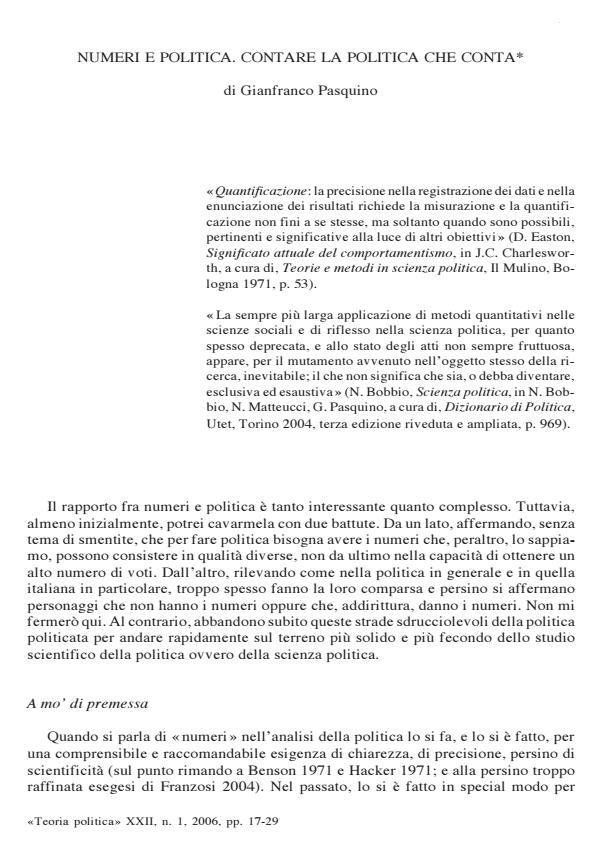Numeri e politica. Contare la politica che conta
Titolo Rivista TEORIA POLITICA
Autori/Curatori Gianfranco Pasquino
Anno di pubblicazione 2006 Fascicolo 2006/1 Lingua Italiano
Numero pagine 13 P. Dimensione file 92 KB
DOI
Il DOI è il codice a barre della proprietà intellettuale: per saperne di più
clicca qui
Qui sotto puoi vedere in anteprima la prima pagina di questo articolo.
Se questo articolo ti interessa, lo puoi acquistare (e scaricare in formato pdf) seguendo le facili indicazioni per acquistare il download credit. Acquista Download Credits per scaricare questo Articolo in formato PDF

FrancoAngeli è membro della Publishers International Linking Association, Inc (PILA)associazione indipendente e non profit per facilitare (attraverso i servizi tecnologici implementati da CrossRef.org) l’accesso degli studiosi ai contenuti digitali nelle pubblicazioni professionali e scientifiche
Numbers may give precision to all kinds of analyses, and also to the analyses of political phenomena. However, political numbers, that is the counting of political phenomena, must be subordinated to well chosen criteria. Numbers alone are never enough. They must be combined with criteria of relevance. In this article, the author makes two examples. The first one is the well-known, but still very important case of the classification of party systems. As Sartori has shown, the simple counting of the number of parties is likely to be totally misleading. The other example refers to the analysis of authoritarian and totalitarian regimes. The definition of authoritarian regimes by Linz is based not just on the number of groups (limited pluralism), but on the fact that authoritarian pluralism is non-competitive and non-responsible. In the same vein, one cannot say that the existence of several groups and associations in the Soviet Union suggested the appearance of pluralism. Associations licensed by the Communist Party were never autonomous. Hence, just counting their number meant fully to misunderstand the evolution of the Soviet Union and to confuse the process of differentiation through modernization with political decompression leading to an opening of the regime (that, in fact, never took place). The overall lesson is that theorizing must always precede counting (and quantification).;
Gianfranco Pasquino, Numeri e politica. Contare la politica che conta in "TEORIA POLITICA" 1/2006, pp , DOI: